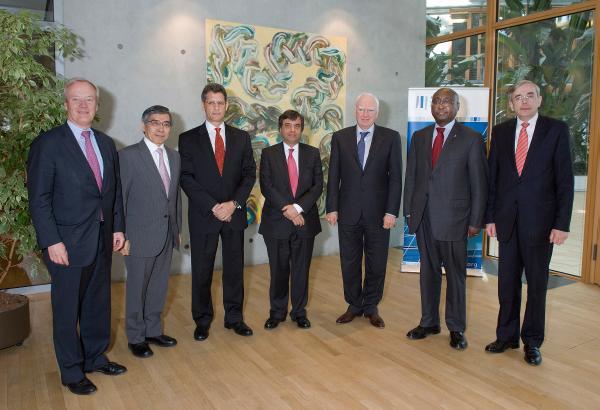
Leading Multilateral Development Banks (MDBs) and the International Monetary Fund, meeting today at the European Investment Bank in Luxembourg, mapped out their plans to support a sustainable global recovery and agreed the Copenhagen Accord is an opportunity for action to finance measures to combat climate change.
On the global economy, they noted signs of recovery and agreed enhanced cooperation among the MDBs and the IMF played an important role in preventing a wider systemic crisis. They concluded the global economy remains fragile and MDBs will need to continue to play a counter-cyclical role in 2010.
In this context they welcomed the agreements on capital increases of the ADB, EIB and IADB and looked forward to the conclusion of negotiations on replenishing resources of the AfDB, EBRD and the World Bank Group.
Beyond the immediate demand of responding to the crisis, the MDBs remain focused on crisis prevention, supporting sustainable growth and development and, in particular, the need to combat climate change.
Following on from their joint statement in December (1), the MDBs and IMF welcome the commitment of developed countries as part of the Copenhagen Accord to provide additional fast track financing for developing countries of USD 30 billion in the period 2010-12 and the pledge to mobilize USD100 billion by 2020 in order to help developing countries cope with the impacts of climate change and achieve the deep cuts in global emissions needed to hold the increase in global temperatures below 2 degrees Celsius.
The MDBs reaffirm their readiness to provide technical support to the UN process and recognize the importance of a legally binding post-2012 international agreement on climate change being concluded as soon as possible. They look forward to progress being made in this regard at the talks this month and next in Bonn.
Implementation of fast track financing is important to build confidence prior to agreeing a new international framework. The MDBs have the experience and capacity to catalyse public and private funds to help deploy such finance efficiently in support of low carbon, climate change-resilient investment in developing countries. They will coordinate their actions as appropriate to enable client countries and other partners to maximise the effective use of additional financial flows. MDBs recognize that the private sector will have a significant role to play in both the financing and implementation of low-carbon investments and underline their commitment to catalyse these funds.
They fully endorsed the UN Secretary General’s establishment of a High Level Advisory Group on Climate Financing and the inclusion of African Development Bank President Donald Kaberuka. They affirm their collective commitment to support the work of the group in the months to come.
As testimony to strengthened collaboration, they welcomed progress in implementing the Climate Investment Funds (CIF), a joint program for financing low-carbon and climate resilient investments by several MDBs. With the endorsement of four new investment plans during CIF meetings in Manila last month, USD 4.4 billion was allocated to support clean technology. The meetings also approved grants for climate resilience for the first two recipients of these funds.
The MDBs will seek to continue harmonizing their approaches in the field of climate change and further joint work towards enhancing knowledge management and sharing of tools and methodologies for supporting countries with vulnerability and climate risk assessments, nationally appropriate mitigation actions and improved forest management.
The MDBs also exchanged views on other issues related to the G20 process, including the fight against non-cooperative tax jurisdictions, strengthening international prudential regulation, combating corruption, reinforcing anti-money laundering, and reducing tax evasion.
Taking part in Friday’s meeting were: African Development Bank President Donald Kaberuka, Asian Development Bank President Haruhiko Kuroda, European Bank for Reconstruction and Development President Thomas Mirow, European Investment Bank President Philippe Maystadt, Inter-American Development Bank Vice President Roberto Vellutini, International Monetary Fund Deputy Managing Director Murillo Portugal. For the World Bank Group, Lars Thunell, Executive Vice President and CEO, International Finance Corporation.
The heads of MDB meeting is a forum for the main international financial institutions to share views and set common objectives on key challenges such as climate change. It is held twice a year. The next meeting is due to take place in October 2010.

Photographer: imedia ©AfDB - BAD
Download original

Photographer: imedia ©To be defined
Download original

Photographer: imedia ©To be defined
Download original